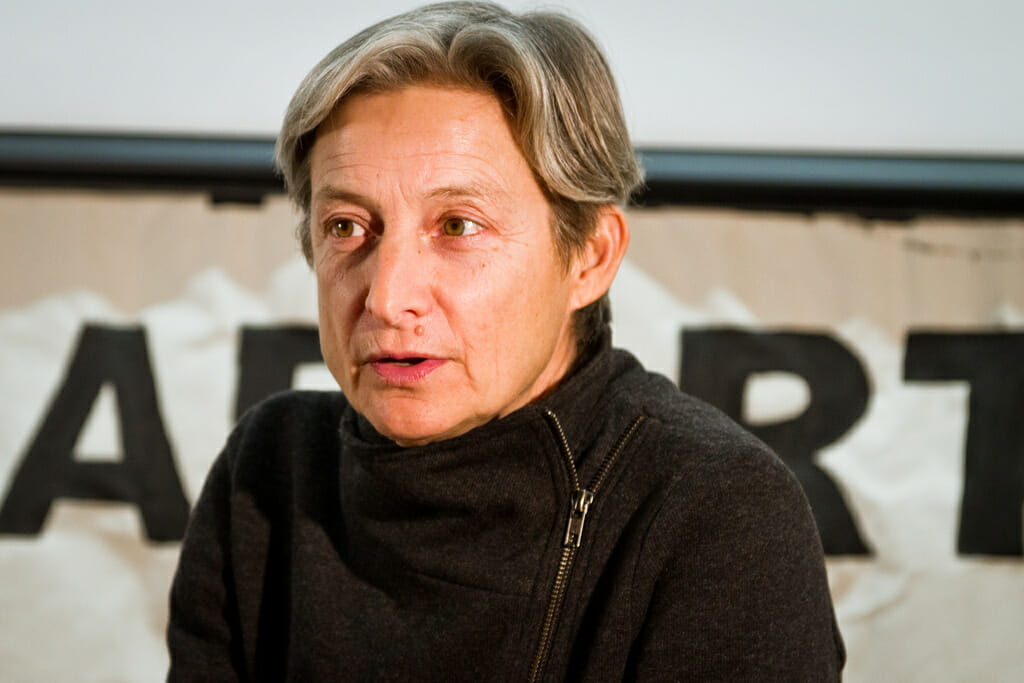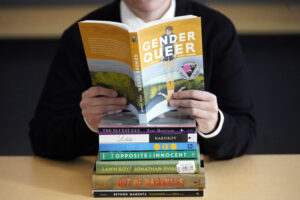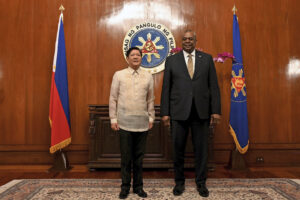The Right to Be Who You Are
Queer theorist and UC Berkeley professor Judith Butler discusses life for bi, lesbian, gay and trans people, as well as their ongoing struggle for acceptance. Judith Butler. (Andrew Rusk / CC BY 2.0)
Judith Butler. (Andrew Rusk / CC BY 2.0)
Queer theorist and University of California, Berkeley, comparative literature professor Judith Butler published “Gender Trouble” in 1990. The book introduced the concept of “performativity,” the idea that gender isn’t something we are but an activity we do. Since she wrote the book, the whole idea of gender has changed radically, and some people, such as Columbia University gender studies professor Jack Halberstam, say that without her work we wouldn’t have the “version of genderqueer-ness” we have now.
Recently, Butler took part in “Radical Movements: Gender and Politics in Performance” in San Francisco, opening the festival with a program titled “Ordinary Practices of the Radical Body,” and talking with Monique Jenkinson, the only cisgender woman to win a major drag pageant.
At the end of 2017, Butler’s ideas provoked controversy at a conference titled “The Ends of Democracy” in São Paulo, where protesters burned her in effigy, shouting, “Burn the witch!”
Between meetings with her students at a Berkeley cafe, Butler talked with Truthdig about how her family constructed their identities in response to the movies, how movement is important to her, how there’s reason for optimism and why we have freedom and joy on our side.
Emily Wilson: You were part of this show about gender and movement. How is movement important to you?
Judith Butler: Monique contacted me, and she was great. She worked with me like you would with a tentative student, and she got me to talk about the place of movement in my life, which was wonderful. I have a sister who is a dancer and was trained in ballet and modern [dance] and went to Juilliard and now lives in Indonesia and does movement workshops. So I lived a good part of my life with a very serious dancer when I was a young person, and there was a lot of expression through movement in my family for whatever reason. And I think it was part of lesbian/gay/queer culture on the weekends—everybody’s dancing and there was a sort of revolutionary zeal to it at LGBTQ events in the ’70s and early ’80s. So it’s part of the culture I grew up with, and it’s been important. Also, as I started to think about gender, I was interested in how people moved, whether it was gesture or gait or expression or how they moved their face or arms. There were ways femininity or masculinity could be signified through subtle movements that weren’t easily classified.
EW: How did you develop your ideas about gender? What made you start thinking about it?
JB: My mother’s family brought silent movies to the city of Cleveland, and they owned a set of movie theaters when I was growing up. So we went to the movies quite often, and I also think as they were assimilating Jews, they took on personas from movies they were showing. They were learning how to be American by watching these films and also how to be glamorous. I think my grandmother modeled herself on Helen Hayes and my grandfather on Clark Gable and my mother, unfortunately, on Joan Crawford. So they were trying to live their lives and wear their clothes and perform their genders through some hyperbolic norms communicated through the movies. I became interested in how they constructed themselves. My mother’s preparation for the day was quite elaborate, putting on her face, and I think she was somewhat dismayed I didn’t do the same and couldn’t figure out why I was refusing this obvious path.
EW: What do you see as the most significant changes since you wrote “Gender Trouble”?
JB: Many things have happened, and there’s an enormous interest in gender in popular culture in the United States, so you can have the show “Transparent” or RuPaul or Chelsea Manning as a major figure. On one hand, there is that opening, and on the other hand, there are some pretty conservative people who don’t like that opening. We saw that in the legal case to shut down bathrooms marked for transgender people. Who could be opposed to having bathrooms marked for trans people? There’s a lot of homophobia, and we see homophobic violence all the time. There was just something on the news about a guy who killed his friend who he said came on to him. So if the question is, is it still possible that somebody who is gay would be killed simply for being gay, then the answer is yes, and it happens all the time. Many countries are still unwilling to accept bi or lesbian or gay or trans people. It’s still very much a basic struggle in this world.
EW: Did the protesters in Brazil shock you?
JB: I wasn’t even talking about gender. I was convening a conference on democracy, asking whether we could still think about the goals of democracy. I did know there’s a right-wing Christian movement against what they call gender ideology. I had been exposed to that in France and Switzerland, but I didn’t know how passionate it was and how well organized it was through social media. There were about 75 of them, and there were about 150 people opposing them. I didn’t actually see the demonstration. I was doing yoga inside. I was pretty strongly protected, but I do think it was frightening. Having one’s image burnt in effigy is something people do to witches or satanic characters, and whatever this gender ideology is, they think it’s from the devil.
I think if you believe God established men and women, and that they are bound together through marriage, and that reproduction should happen in heterosexual marriage alone, and if the concept of gender says the category of man and woman change through time and maybe some people don’t fit in either one of those categories, you’re contesting biblical authority. That was never my aim, but yes, I’m contesting biblical authority. They’re right to be angry with me (laughs).
But that means they’re against reproductive technology, they’re against abortion, they’re against trans rights, they’re against feminism, they’re against single mothers, they’re against feminism. These all represent struggles to gain greater freedom and equality. This group wants to take us back to heterosexual reproduction only in marriage and very strict rules about what a man is and what a woman is. It is a real opposition, and we are on opposite sides. That is correct. Except, I would say, there are some fabulous Christian groups that are gay affirmative and trans affirmative and care about the poor and justice for the oppressed. So their version of Christianity is not everyone’s version.
EW: I saw a short interview you did after what happened in Brazil, and you said that the feminist, gay and trans world the conservatives want to destroy is too powerful, and it will win because it has freedom and joy on its side. Can you say more about that?
JB: There was an editor in Sao Paulo who said, “Look, things are really terrible, Trump is president, the white nationalists are assuming power, they’re frightened in Brazil of rising authoritarianism—what hope is there? It’s all so bleak.” I said I felt there was reason for optimism, and people do want to be free, and there’s a desire for freedom. I don’t know if that’s really true, but I liked saying it. It felt free to say it. Maybe it was more, “I hope this is true,” or, “Let this catch fire.”
There are people trying to make us go back, like in Brazil. People want to shut down the trans or gay community, or human rights achievements, but that’s an enormous moment. They’re not going to shut it down, but they will make it hard. If you look at the number of killings [of] women or trans people or gay people in Brazil, it’s very frightening, it’s horrific. But it’s a very strong movement, and a lot of people are struggling and making headway in culture and the arts and education and politics and human rights. It’s ongoing—it’s definitely ongoing.
[Editor’s note: On March 14, Marielle Franco, a lesbian politician in Brazil, was was assassinated. Her murder has made her a human rights icon.]
EW: Are you interested in conversations with conservatives?
JB: I gave a talk on free speech and academic freedom, and somebody from the audience said, “Why aren’t there conversations between people on the left and more conservative people?” I said I was happy to debate people with conservative viewpoints. I cited the James Baldwin/William Buckley debate that I thought was really quite incredible. But it’s hard to get people to debate who are serious about debate and not just trying to bludgeon you with their viewpoint or mock you for having your viewpoint, but where people really go to the heart of the issue and think together about what their differences are and why they have them.
I’m actually willing to debate almost anyone. I think I would draw a line with Nazis or white nationalists—I think I’m not going to give a platform to somebody whose views are so beyond the pale. It doesn’t make any sense. But there are conservatives I’m more than happy to debate with. Maybe we differ on fiscal policy or have a different idea of what freedom is, but that could be interesting.
Your support matters…Independent journalism is under threat and overshadowed by heavily funded mainstream media.
You can help level the playing field. Become a member.
Your tax-deductible contribution keeps us digging beneath the headlines to give you thought-provoking, investigative reporting and analysis that unearths what's really happening- without compromise.
Give today to support our courageous, independent journalists.






You need to be a supporter to comment.
There are currently no responses to this article.
Be the first to respond.